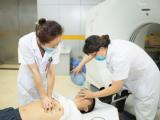The Centers for Disease Control and Prevention (CDC) said today that more than 30 US patients have been tested for MERS-CoV (Middle East respiratory syndrome coronavirus), as clinicians asked questions about the criteria for testing people who show up in emergency rooms with suspicious symptoms.
During a conference call to update clinicians on MERS-CoV, the CDC's Susan Gerber, MD, emphasized that no cases have been detected in the United States yet, but said the CDC has tested patients from various parts of the country since the virus was discovered last September.
Gerber, a medical epidemiologist, didn't specify how many patients have been tested, but Mark Pallansch, PhD, director of the CDC's Division of Viral Diseases, told CIDRAP News that the CDC has tested more than 30 suspected cases, all with negative results.
Unofficially, 58 MERS-CoV cases, 33 of them fatal, have been reported since the virus was identified last September, all of them with direct or indirect ties to the Middle East. (The official World Health Organization count is 55 cases with 32 deaths, but Saudi Arabia reported three more cases, one fatal, yesterday.)
The CDC is advising clinicians to consider MERS-CoV in patients who have an unexplained, acute respiratory illness, which may include fever or cough, with suspected pneumonia and a history of travel from the Arabian Peninsula or neighboring countries within the past 14 days. The illness also should be considered in persons who are close contacts of such patients and have a severe acute respiratory illness.
During the Clinician Outreach and Communication Activity (COCA) conference call, Gerber was asked several questions about the appropriate level of MERS-CoV vigilance in hospital emergency departments (EDs). One participant, for example, asked "whether you believe we should begin active screening at all our emergency departments?"
Gerber replied by summarizing the CDC's surveillance case definition, adding, "We do not have any case in the US as yet, but we're trying to alert clinicians and public departments to look for these features, as an astute clinician would be important in possibly identifying a first case."
Another participant asked what should trigger questions about a patient's travel history. Gerber replied that it's important to get a travel history for anyone who comes to an ED with a severe acute respiratory infection, and also to ask about the travel history of such patients' close contacts.
Another listener wondered if MERS-CoV should be considered for patients with influenza-like illness.
Gerber responded that some MERS-CoV cases have been mild, but most have been severe. "Right now our surveillance is focused on severe acute respiratory infections. However, as data or the situation changes, it could be different," she said.
She commented that CDC-developed tests for the novel virus are becoming more widely available, which will enable more laboratories, especially state health department and Laboatory Response Network facilities, to test for the virus.
For cases with a high index of suspicion for MERS-CoV, the CDC recommends testing for it without first ruling out other possible causes, Gerber said.
She reviewed what's been learned about MERS-CoV, relying mainly on published reports, but the question-and-answer period following her presentation served to illustrate how much remains unknown.
When a participant asked about the kinds of comorbidities reported in MERS-CoV patients, Gerber said, "We don't know all the comorbidity information; however, some have included renal transplantation, malignancy, steroid therapy, and renal failure."
In response to a question about surveying US military personnel who recently returned from the Middle East, Gerber said the CDC is working on a serologic test for the virus, but it has not yet been validated. "A validated serologic assay would be very useful in populations such as the one you describe," she said.
Regarding travel advisories, another CDC official on the call said the agency has a "watch" on the Middle East for MERS-CoV, the lowest of three alert levels. The agency is not recommending that anyone change their travel plans, but travelers are advised to monitor their health for 2 weeks after returning from the region.
In other comments during the question-and-answer period, Gerber said:
- There are no good data yet on how long MERS-CoV can survive in the environment.
- The animal source of the virus remains unknown, but investigations are ongoing.
- There is no evidence so far that people can transmit the virus before they have symptoms, but information is limited.
- The virus has been found in the blood of sick patients, but it is unknown whether viremia can occur before onset of symptoms.
- While one patient, the index patient in France, had diarrhea before any respiratory symptoms, the information on initial signs and symptoms remains very incomplete.
Eurosurveillance reports
In related news today, Eurosurveillance published a report providing more details about the first two cases in France, which involved a 64-year-old man who got sick after a trip to Dubai and a 51-year-old man who shared a hospital room with him.
The report says that the index patient, who died on May 28, had had a kidney transplant, and that the second patient remains isolated in an intensive care unit.
"The respiratory presentation of the index case strongly suggests an airborne transmission in the hospital room shared by both patient," the article states. "However, some questions remain about the possible infectiousness of other body fluids or clinical samples, including stools as the index case presented with diarrhoea at an early stage of his disease, and a cross transmission through contaminated surfaces, medical devices or hands of healthcare workers cannot be ruled out."
And in a Eurosurveillance commentary, a team of epidemiology experts from London's Imperial College sketched out three possible transmission scenarios for MERS-CoV, making a case that more detailed case reporting would be useful for gauging how the epidemic may unfold and how the threat might be controlled.
The group said they supported urgent appeals for more data on the MERS-CoV cases, which could shed light on the transmission situation.
"Given the current level of uncertainty around MERS-CoV, it is important that adequate data are collected on future cases to underpin rigorous assessment of the transmission characteristics and severity of MERS-CoV, and the public health threat it may pose," they wrote.
Staff writer Lisa Schnirring contributed to this story.
See also:
Jun 13 COCA call information
Jun 13 Eurosurveillance report on cases in France
Jun 13 Eurosurveillance commentary





















